
Meja Anna Pernilla Kullersten is a Swedish composer, artist and singer. Among her best known songs are "Happy", "Private Emotion", a duet with Ricky Martin from his multi-Platinum album Ricky Martin (1999), and "All 'Bout the Money", which was nominated for a Grammy Award in 1998.

2 Unlimited are a Belgian-Dutch dance music act, founded by Belgian producers/songwriters Jean-Paul De Coster and Phil Wilde in 1991 in Antwerp, Belgium. From 1991 to 1996, Dutch rapper Ray Slijngaard and Dutch vocalist Anita Doth fronted the act. During these five years, 2 Unlimited enjoyed worldwide mainstream success. They scored a total of sixteen international chart hits, including "Get Ready for This", "Twilight Zone", "No Limit", and "Tribal Dance". The act has sold eighteen million records worldwide. Although they enjoyed less mainstream recognition in the United States than in Europe, several of their tracks became popular themes in American sporting series, mainly in the NBA and NHL.

"No Limit" is a song recorded by Belgian/Dutch Eurodance group 2 Unlimited, released in January 1993 by Byte, ZYX and PWL. It was their fifth single in total and the first to be released from their second album, No Limits! (1993). Co-written by the group's Ray Slijngaard and Anita Dels, the song became one of their most commercially successful singles, especially in Europe, reaching the number-one spot in 35 countries and the top 10 in several others. Like previous releases, the UK version of the single removed all of the raps from Slijngaard, leaving just Dels' vocals. One word from the rap was kept, the word 'Techno' which was looped and repeated during the middle of the song, turning the line into "Techno! Techno! Techno! Techno!" and giving the song an extra vocal hook. Its accompanying music video was directed by Nick Burgess-Jones and received heavy rotation on MTV Europe.

"Right in the Night (Fall in Love with Music)" is a song by German electronic music duo Jam & Spoon, released by JAM! and Dance Pool as the second single from the duo's second album, Tripomatic Fairytales 2001 (1993). It is a Eurodance song with elements from progressive and vocal trance. It is based on "Leyenda" by the classical composer Isaac Albéniz and features vocals by American vocalist Plavka, with lyrics by Nosie Katzmann. The flamenco-styled riff in the song is played by duo member Jam El Mar, who was trained as a classical guitarist.

"Fading Like a Flower (Every Time You Leave)" is a power ballad by Swedish pop duo Roxette from their third studio album, Joyride (1991). Written by Per Gessle and produced by Clarence Öfwerman, the song was released as the second single from Joyride on 29 April 1991, by EMI Records. It became the duo's fifth consecutive Top 10 hit single in the United States, peaking at No. 2 on the Billboard Hot 100. The single reached the Top 10 in an additional 12 countries.
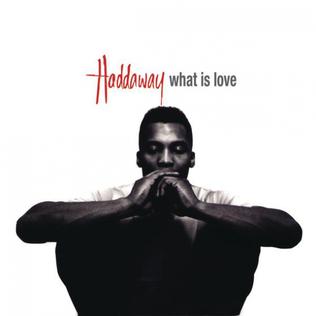
"What Is Love" is a song by Trinidadian-German singer Haddaway, released as his debut single from his debut album, The Album (1993). The song, both written and produced by Dee Dee Halligan and Karin Hartmann-Eisenblätter, was released by Coconut Records in January 1993. It was a hit across Europe, becoming a number-one single in at least 13 countries and reaching number two in Germany, Sweden and the United Kingdom. Outside Europe, the single peaked at number 11 in the United States, number 12 in Australia, number 17 in Canada, and number 48 in New Zealand.

"Gimme! Gimme! Gimme! " is a song by Swedish band ABBA. It was recorded in August 1979 to help promote ABBA: The Tour, their North American and European concert series, and was released on ABBA's Greatest Hits Vol. 2 album as a brand new track.
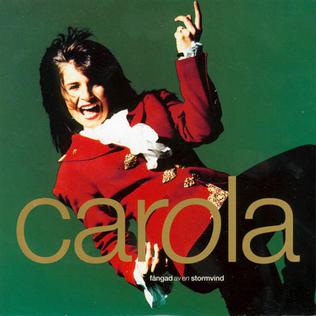
"Fångad av en stormvind" is a song recorded by Swedish singer Carola, written and produced by Stephan Berg. It represented Sweden in the Eurovision Song Contest 1991 held in Rome, winning the contest, having previously won that year's Melodifestivalen.

"No More Tears (Enough Is Enough)" is a 1979 song recorded by American singers Barbra Streisand and Donna Summer. It was written by Paul Jabara and Bruce Roberts, and produced by Giorgio Moroder and Gary Klein. The song was recorded for Streisand's Wet album and also as a new track for Summer's compilation double album On the Radio: Greatest Hits Volumes I & II. The full-length version was found on Streisand's album, while a longer 11-minute edit (the 12" version) was featured on Summer's album. The longer 12" version features additional production by frequent collaborator Harold Faltermeyer, and incorporates a harder rock edge.

"Show Me Love" is a song performed by American singer Robin S. The song was written by Allen George and Fred McFarlane, originally released in October 1990 by Champion Records in the United Kingdom. In 1992, it was remixed by Swedish house music production duo StoneBridge and Nick Nice, and re-released in many European countries as well as the United States and Japan. It became one of the most well known house anthems in the United Kingdom, and Robin's biggest hit to date. It helped to make house more mainstream. In 1993, it was included on Robin S.'s debut album of the same name. Confusion arose with the 1997 hit "Show Me Love" by Swedish singer Robyn, due to their homonymous names and identical titles.
Rob'n'Raz were a Swedish music duo of Robert Wåtz and Rasmus Lindwall.

"Got to Get" is a song by Swedish electronic dance music duo Rob'n'Raz featuring singer-songwriter and rapper Leila K. Released in 1989 as her debut single, it was also the lead single from their only album together, Rob'n'Raz featuring Leila K (1990). It was very successful in Europe, reaching the top 10 in at least nine countries, like the UK, where it peaked at number eight in November same year. The song also charted in the US, Canada and Australia. Two different music videos were made to accompany it.
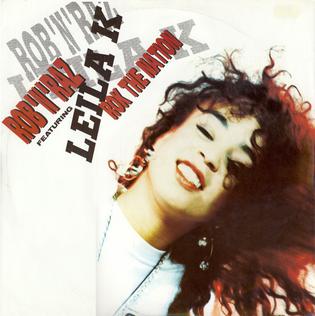
"Rok the Nation" is a song by Swedish electronic music duo Rob'n'Raz featuring rapper Leila K, released in March 1990 by BMG as the second single from their debut album, Rob'n'Raz feat. Leila K (1990). It peaked at number three in both Sweden and Finland. Additionally, the song was a top-20 hit in the Netherlands and Switzerland, and a top-30 hit in Ireland and West Germany. In the UK, "Rok the Nation" reached number 41 on the UK Singles Chart.

"Set the World on Fire" is a 1994 song recorded by the Swedish musician known as E-Type. It features vocals by singer Nana Hedin and was released as the first single from his debut album, Made in Sweden. The song was a hit in several countries, particularly in Sweden where it reached number 2. It was released twice, first in 1994, then in 1995, and also featured twice on the album Made in Sweden: in the original studio version, and in an acoustic version. In 1996, it was released in the United States and peaked at #22 on the Billboard Hot Dance Club Play; it remained charted for a total of 11 weeks.

"Ain't That Just the Way" is a song written by Bruce Belland, Glen Larson and Stu Phillips. American model, actress and singer Barbi Benton originally recorded it for release as the B-side of her 1975 single "The Reverend Bob". It became a major hit in Scandinavia, especially in Sweden, topping the Swedish singles chart for 10 weeks in 1977. It also topped the charts in Finland. In 1978, it appeared on her album with the same name, released only in Scandinavia. The song was performed in the McCloud TV series. In 1996, Lutricia McNeal's cover of "Ain't That Just the Way" became a hit in Europe and New Zealand.
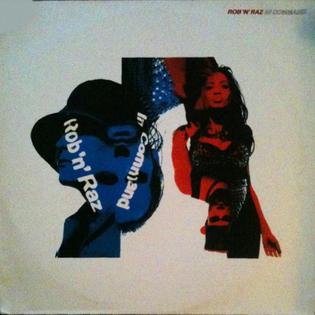
"In Command" is a song by Swedish dance music duo Rob'n'Raz, featuring American singer Lutricia McNeal and rapper D-Flex. Released in November 1993 by Warner Music as the fourth single from the duo's second album, Clubhopping (1992), it became a number-one hit in Sweden, with a total of 17 weeks within the Swedish singles chart. Additionally, the song peaked at number four in Finland and was a top 40-hit on the Eurochart Hot 100, reaching number 39 in January 1994, after debuting at number 85 in December 1993. Outside Europe, "In Command" was a huge hit in Israel, peaking at number three. It also won an award in the category for Best Swedish Dance Track 1993 at the 1994 Swedish Dance Music Awards.

"Stranded" is a song by American singer Lutricia McNeal, released as the third single from her debut album, My Side of Town (1997), in May 1998. The song was a top 10 in Austria, Hungary, Ireland, Norway, Sweden, and the United Kingdom. In the latter, it reached number three on both the UK Singles Chart and the UK R&B Chart. On the Eurochart Hot 100, it peaked at number 10 in June 1998. Outside Europe, the single was a top-three hit in New Zealand and also peaked at number six on the US Billboard Hot Dance Club Play chart. In 1999, it was reported that "Stranded" had sold 2 million copies.
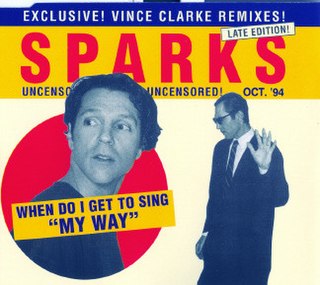
"When Do I Get to Sing 'My Way'" is a song by American band Sparks, released in October 1994 by Logic Records as the first single from their 1994 album Gratuitous Sax & Senseless Violins. Written and produced by band members Russell and Ron Mael, the song references Frank Sinatra's signature song "My Way" and was a number seven hit in Germany. In the United States, it reached number nine on the Billboard Hot Dance Club Play chart, and it was also a top 40 hit in the United Kingdom. The song was re-released as a single the following year, this time peaking at number 32 in the UK. Its accompanying music video was directed by Sophie Muller.
Swedish Dance Music Awards was a Swedish dance music award that started in 1990 by John Wallin and Jonas Siljemark. At that time Swedish dance artists had no national media exposure compared to the massive coverage they were receiving internationally. Wallin and Siljemark felt that the home market of such successful artists didn't give the respect the artists deserved. That is how they came up with the idea of the Swedish Dance Music Awards. It was broadcast live on television and radio and got much media coverage.

"Power House" is a 1994 song by Swedish dance music duo Rob'n'Raz, featuring American singer Lutricia McNeal and rapper D-Flex. It was released as the third and last single from the duo's third album, Spectrum (1993), and peaked at number 12 in Sweden, with a total of 12 weeks within the singles chart. The song also topped the Swedish dance chart and charted in Finland, where it reached number 13.

















